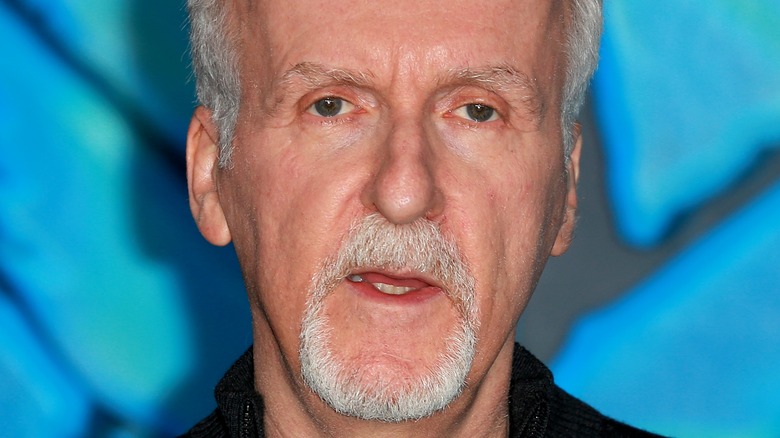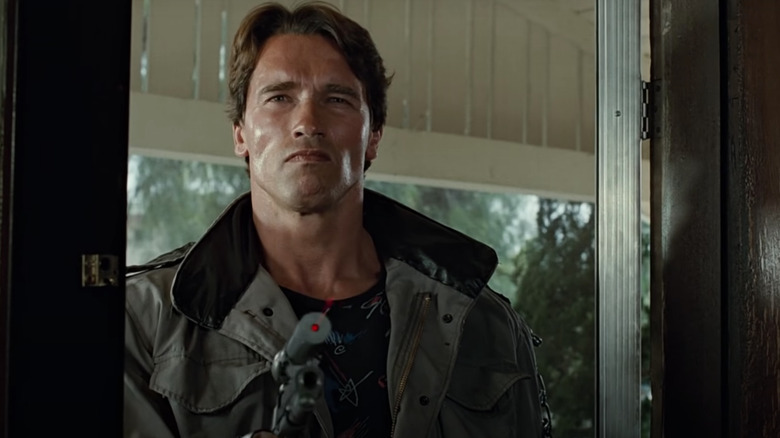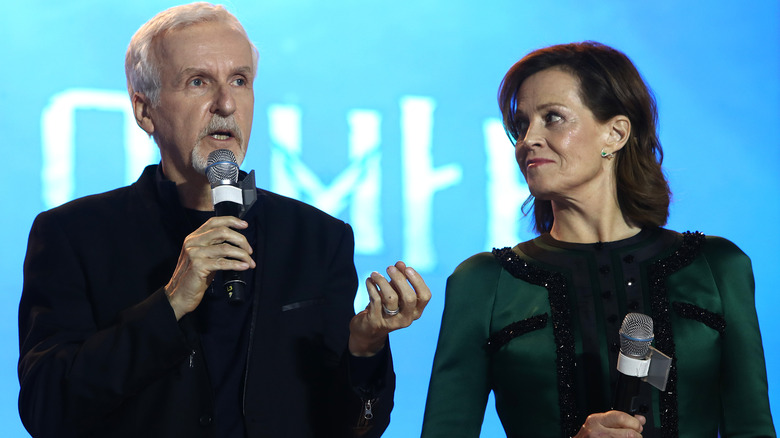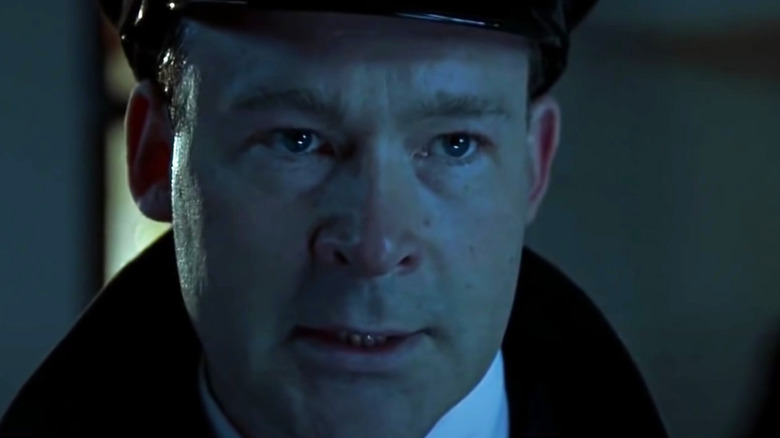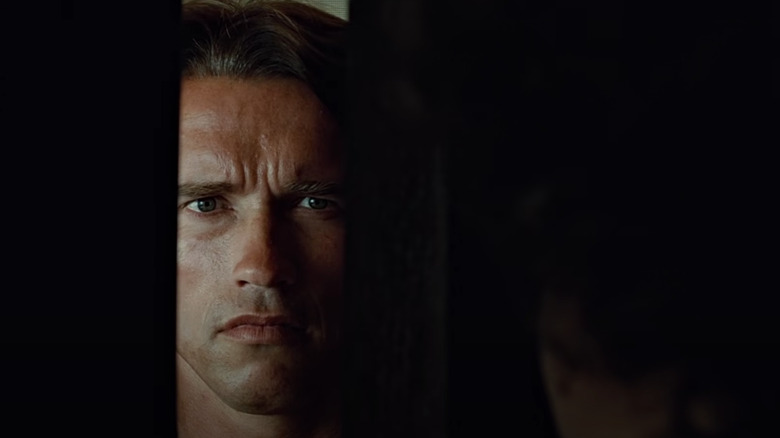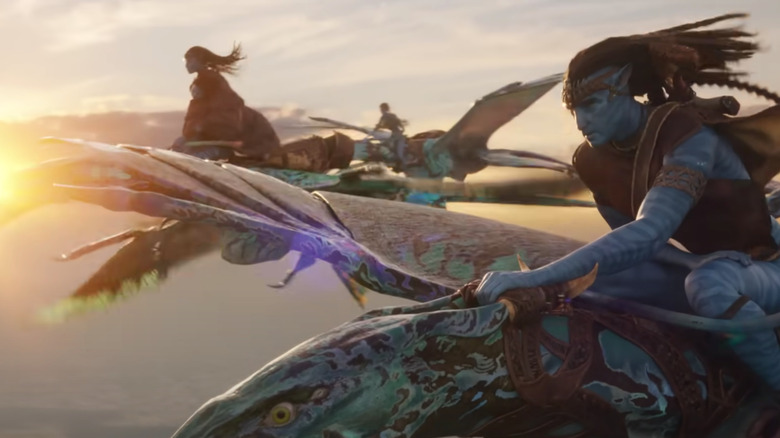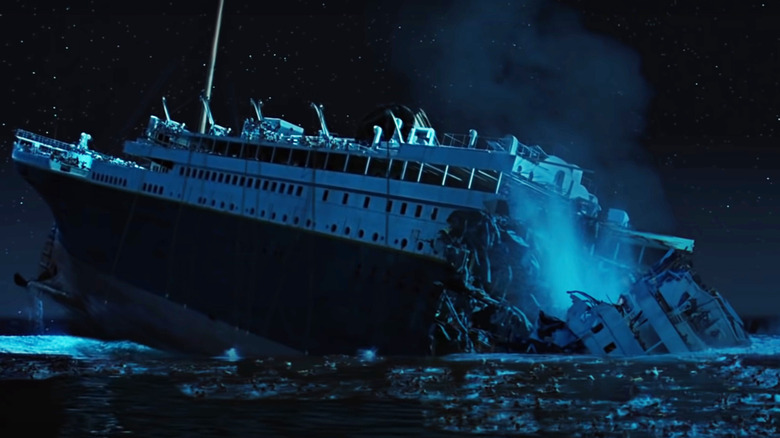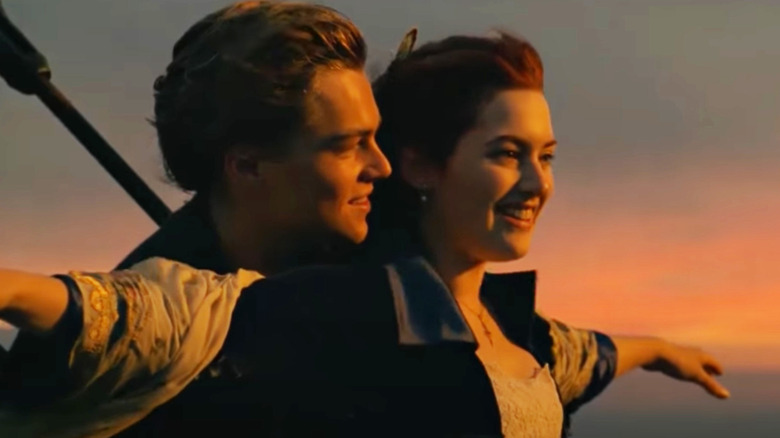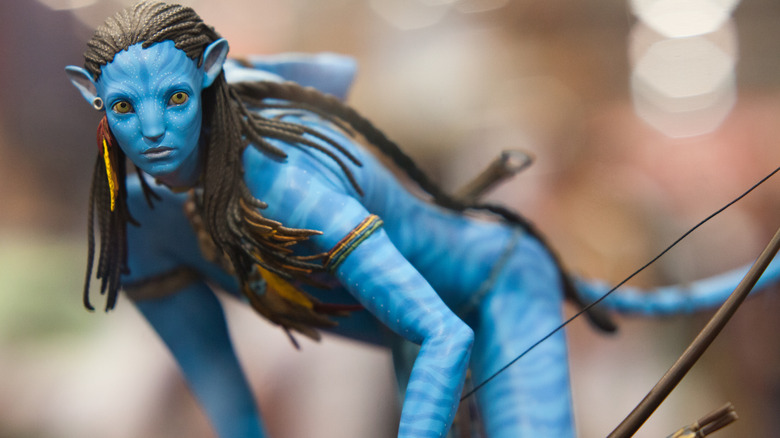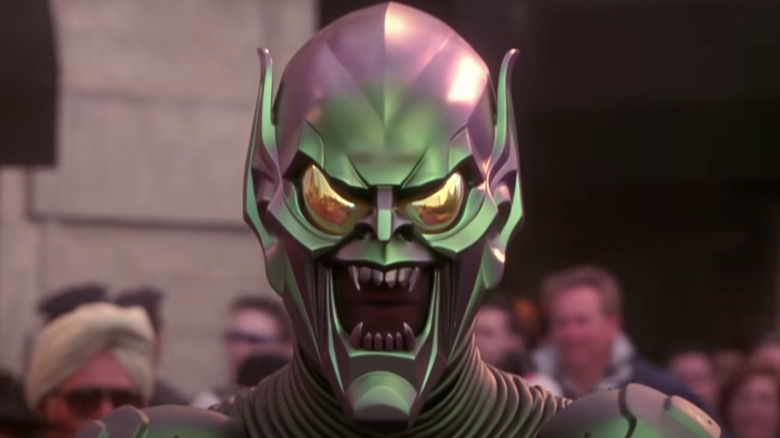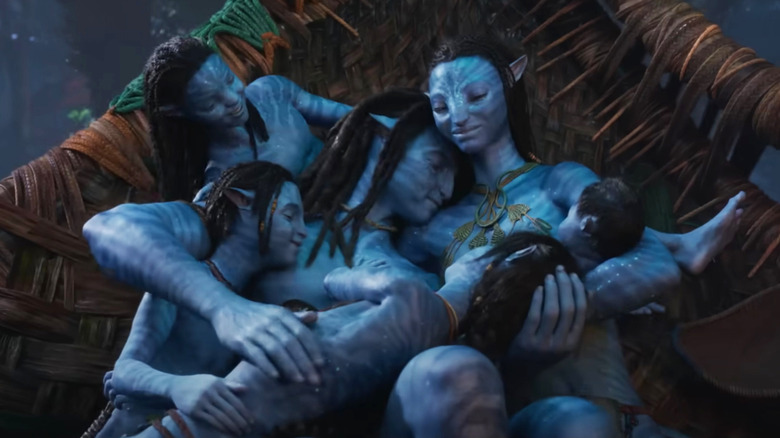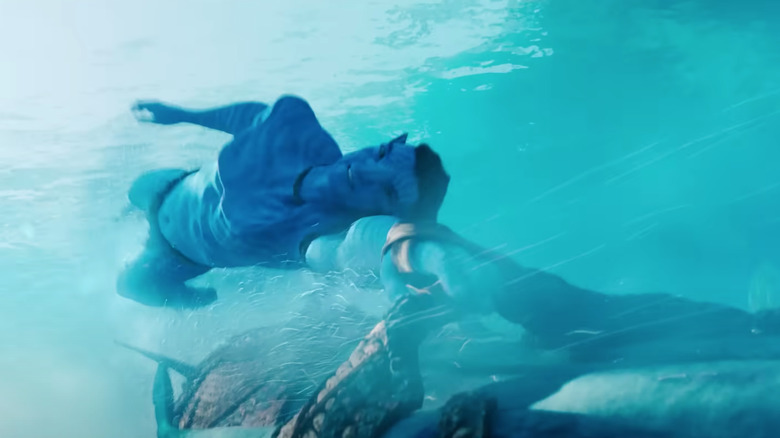James Cameron Facts That Are Wilder Than A Trip To Pandora
Every director has box office bombs and movies that don't work, but James Cameron's batting average may be the strongest in cinema history. Other than "Piranha II: The Spawning," he's had a tremendous track record: "Terminator" 1 and 2, "Aliens," "The Abyss," "True Lies," "Titanic," "Avatar" and now its spectacular follow-up, "Avatar: The Way of Water."
Cameron has always been an insanely driven workaholic, and he always wants to give audiences the biggest spectaculars he can make. In doing this, he usually breaks the bank (practically every movie he makes becomes the most expensive movie ever made), and he makes big leaps forward with technology. As he told The New Yorker, "If you set your goals ridiculously high and it's a failure, you will fail above everyone else's success."
At 68, he's clearly not resting on his laurels. As he told GQ, "I like difficult ... I go straight to difficult." With "The Way of Water," Cameron has upped the ante in terms of ambition, scope, spectacle, and budget (it reportedly cost more than $350 million), but as several critics remarked after seeing the film, don't bet against the guy. Like Alfred Hitchcock and Steven Spielberg, when you see a Cameron film, you know what you're going to get, but there's a lot about the man you may not know. Here are some James Cameron facts that are wilder than a trip to Pandora.
He sold The Terminator rights for a dollar
You can't be a player if you don't roll the dice, and James Cameron is not afraid to put his money where his mouth is to get his movies made. In fact, he was willing to give up "The Terminator" rights for the grand total of a buck so he could direct the film. Cameron comes from a blue-collar background; he worked as a truck driver before deciding to abandon the security of a regular gig to become a filmmaker. He was reportedly living in his car before the success of "The Terminator."
Cameron had already directed a previous movie, "Piranha II: The Spawning," the sequel to the 1978 Roger Corman film, and this did not make him a frontrunner to direct "The Terminator." As IGN reports, producers liked the script but didn't think Cameron was experienced enough to helm an intense action movie. To get around this, Cameron sold the script to producer Gale Anne Hurd for a dollar, with the stipulation that Cameron direct the film. Eventually, Hurd became one of Cameron's wives (he's been married five times).
Although it got the movie made, and immediately established Cameron as an A-list director, he later regretted his decision, telling The Toronto Sun (via Business Insider), "I wish I hadn't sold the rights for one dollar. If I had a little time machine and I could only send back something the length of a tweet, it'd be — 'Don't sell.'"
He's not easy to work with
James Cameron has a reputation in Hollywood for being one of the best directors who can deliver spectacle and special effects on an epic canvas. He's also known for being one of the toughest directors to work with, and working on a Cameron film is often compared to joining the Marines. The stories of Cameron loudly losing his cool are legion. The LA Times even ran an article called "James Cameron's greatest tantrums." One time, for example, when Arnold Schwarzenegger disappeared from the "True Lies" set, Cameron screamed, "Do you want Paul Verhoeven to finish this motherf***er?"
Schwarzenegger also recalled Cameron not allowing him to go the bathroom when he was shooting a cockpit segment for the film, with the director yelling that the actor was supposed to be "in character" and saving "your daughter, there is no bathroom right now." (Arnold then joked he opened up the cockpit and peed on him.) Additionally, crew members called "The Abyss" "The Abuse," and when the bad side of Cameron came out, his coworkers often referred to him as Mij, which is Jim spelled backward. His crews also wore shirts that said: "You can't scare me — I work for James Cameron." Recently it was also reported that on the "Avatar" set he would nail people's cell phones to the wall with a nail gun if they went off during the shoot.
Yet Sigourney Weaver and Kate Winslet, who worked with Cameron on "Aliens" and "Titanic" respectively, and who both have roles in "The Way of Water," feel that Cameron has calmed down in recent years. Weaver told The Hollywood Reporter Cameron's "a much more relaxed director ... He's still driven, but it's much warmer colors." Winslet also told The Independent that Cameron is "much more calm now." (During the "Titanic" shoot she recalled being "genuinely terrified" of him.)
He was poisoned with PCP on the Titanic shoot
Trying to recreate the wreck of the Titanic was tough enough, but a practically impossible shoot was made worse when the food was spiked with PCP. It's still unclear who the culprit was or what the motive was, but the incident happened on August 9, 1996, and it affected about 60 people on the shoot. As Bill Paxton told Entertainment Weekly, "One minute I felt okay, the next minute I felt so goddamn anxious I wanted to breathe in a paper bag."
James Cameron felt "distinctively woozy," and at first he thought it was food poisoning, then they realized they'd been dosed with PCP. Again, the culprit was never identified, but Cameron believed it was an angry crew member who got fired (which doesn't narrow down the list of suspects). Thankfully nobody was seriously hurt, and the shoot started up again the next day.
He convinced Schwarzenegger to play a bad guy with minimal dialogue, and made him a star
While Arnold Schwarzenegger took a big step up as a movie star when he played "Conan the Barbarian," it was "The Terminator" that cemented his iconic status, making him one of the biggest stars of the '80s. Schwarzenegger famously didn't want to take the role, though. Up for the part of Kyle Reese, he initially resisted the role of The Terminator. (O.J. Simpson was actually up for the role, and many relished the irony of this after he went on trial for double murder.) The Terminator was a villain, and he barely had any dialog — about 16 lines actually — but James Cameron explained, "Don't worry about the amount of dialogue. It will be one of the most memorable characters of the year, maybe even of the decade."
As Schwarzenegger shared, "I didn't think I had established myself yet enough as a hero to be a villain." Yet when Cameron observed Schwarzenegger, he thought he looked like "a human Panzer tank." He then said, "Well, he's wrong for Reese. But he'd make a hell of a Terminator."
Despite his initial resistance, when Schwarzenegger saw 20 minutes of footage he knew he'd made the right move, and that "The Terminator" was going to be a bigger movie than anyone realized. And indeed, it became the surprise hit of 1984, cementing Schwarzenegger as an A-list action star and establishing one of the most important franchises in cinema history.
Avatar was supposed to be made in 1996
James Cameron has always been ambitious, and he always pushes the envelope with technology in every film he makes. In fact, Cameron wanted to make "Avatar" in the '90s, but the technology wasn't up to speed for what he envisioned. Cameron wrote a treatment for the film in 1994, but he made "Titanic" instead. Cameron finally felt the technology was there to bring his vision of Pandora to life in 2005, and Fox gave him $10 million to shoot some test footage. The studio was impressed enough to give Cameron a reported $250 million to make the movie, and off he went.
Motion capture technology, popularized by Peter Jackson in the "Lord of the Rings" films, went a long way to bringing "Avatar" to life. A special camera was created that showed how the actors worked with the digital effects in real time. With this technology, Cameron created a fully immersive world, and he called "Avatar" "a true hybrid — a full live-action shoot, with CG characters in CG and live environments." (He also wanted the audience to have "no idea which they're looking at.")
He beat the sequel curse three times with Terminator, Aliens, and Avatar
Back in the day, sequels were usually a case of diminishing returns. A truly great sequel, like "The Empire Strikes Back," was a rarity, but in recent years filmmakers have strived to make sequels as good, if not better, than the originals. With "The Terminator," "Aliens," and "Avatar: The Way of Water," James Cameron managed to beat the sequel curse three times and deliver rousing follow-ups to the originals. As Brian Eggert of Deep Focus Review writes, "If more filmmakers took Cameron's approach to sequel-making, Hollywood's franchises might not seem so dull and homogenized today."
"Aliens" has a 98% score on Rotten Tomatoes along with a 94% audience score. He wisely took the sequel in a different direction than the original, and as critic Keith Garlington says, "Aliens" is "an extremely ambitious sequel that took a pretty sacred first film and built upon it in the most satisfying way."
"Terminator 2" currently has a 93% score on Rotten Tomatoes and a 95% audience score. As critic Mike Massie writes, "While bigger isn't always better, writer/director James Cameron's follow-up is genuinely bigger and better in nearly every way."
He gave up his Titanic salary when the movie went over budget
As James Cameron explained on The Howard Stern Show, he initially thought "Titanic" was going to cost $120 million, but that turned out to be a fantasy. "That's what we thought it was going to cost. That's why I wound up giving 'em back all my money. I said, 'Guys, I don't want you to think we lied to you to get you to make this movie.'"
Cameron further explained he would have gotten a piece of the gross if things went the way they were supposed to: "But my philosophy is I take responsibility. The buck stops here. I'm not going to be out on the street selling pencils." As reported in The New Yorker, Cameron gave up his directing and producing fees when the movie went wildly over budget, which cost him about $10 million, but he kept approximately $1 million for writing the script. However, once "Titanic" was a monster hit, Rupert Murdoch gave Cameron back 10% of the film's gross, which may have added up to $150 million.
Titanic overcame very bad buzz
Before "Titanic" came out in December 1997 and became the biggest moneymaker of its time, the buzz on the film was bad, and many people in Hollywood were predicting doom. "Titanic" cost $190 million, which meant the film cost about $1 million per minute, and its troubled production reminded some of "Heaven's Gate," the legendary bomb that helped put United Artists out of business. "Titanic" was a period film; it was long, 3 hours and 14 minutes when long films weren't in vogue. A long movie also meant the theaters were losing one showing a day, which meant the film made less money.
In fact, opening weekend, "Titanic" barely beat out the latest James Bond film, "Tomorrow Never Dies," by $3.5 million, but word of mouth spread like wildfire and the film had big repeat business. At the time, movies with repeat business were, on average, 2%, but "Titanic" had repeat business of 20%. "Titanic" would ultimately stay in the number one spot for 15 weeks, and beat nearly insurmountable odds to become the #1 moneymaker in cinema history; until "Avatar" of course.
He helped save Guillermo del Toro's father when he was kidnapped
Guillermo del Toro and James Cameron have been friends for a long time, and Cameron was a big help in del Toro's darkest hour when his father was kidnapped in 1997. Cameron and del Toro first met at a barbecue in L.A. when del Toro had just wrapped up his first movie, "Cronos," and Cameron had finally completed "Terminator 2" (via CinemaBlend). They grew to be close friends, and according to reports, it was Cameron who gave del Toro the ransom money — reportedly a million dollars — to get his father, Federico, back.
Del Toro clarified that Cameron didn't pay the ransom, but "he paid for the negotiator, and we paid [Cameron] back a little while after. It was a really, really harrowing situation. And he came in and took charge. He said, 'The hostage negotiator will be in your house in 72 hours to help you go through the process.'" Del Toro also said that Cameron volunteered to help, and offered to pay the ransom itself, but del Toro took care of that. After being held hostage for 72 days, Federico was released safely.
He currently lives in New Zealand in the same town as Peter Jackson
After "Terminator 2," James Cameron moved to a gated home in Malibu where his neighbors were Mel Gibson and Britney Spears. Now he lives in New Zealand, in the same town as his friend Peter Jackson, Wellington. ("Peter and I are pals," Cameron has said.)
Cameron owns a home and a farm in Wellington, about 5,000 acres, and he also became a vegan. Cameron and his wife, Suzy Amis, moved full-time to Wellington when the pandemic hit, and he doesn't miss L.A. at all. Whenever he comes back to the city of angels, he thinks, "Wow, this is an abomination against nature, this place. I can't believe I lived here so long."
Cameron also said that in New Zealand, where assault rifles are banned, "I don't have to think about guns here." Cameron, who was trained in firearms by the guy who trained Keanu Reeves when he did "John Wick," added, "I'm a competition-grade shooter. But I don't have to worry about it here."
He almost directed Spider-Man
James Cameron making a Marvel film? The mind boggles. In fact, Cameron was supposed to write and direct the big-screen version of "Spider-Man" before the rights wound up at Sony with Sam Raimi directing. Cameron would call "Spider-Man" the greatest movie he never made, and he wrote a detailed outline that he called a scriptment for the film. His version of "Spider-Man" was also going to have two villains, Electro and Sandman.
So why didn't the king of the world make the movie? The rights to "Spider-Man" were a complicated mess to untangle, and it took years to finally clear the way for a big-screen version of the famous webslinger. (He also considered Leonardo DiCaprio and Arnold Schwarzenegger for the cast, when they were much younger of course.)
Cameron was going to make "Spider-Man" at Carolco, who made "Terminator 2" and "Total Recall," but then the company went bankrupt. The rights went back to Marvel, and Cameron turned up the heat on Fox, the studio he's worked with most of his career, to get the rights. Apparently not willing to untangle the messy litigation behind the property, Fox passed up a big opportunity, Spidey ended up at Sony, and the rest is history.
The Way of Water is his most personal film
James Cameron's films aren't all about technology and bombast. As evidenced in "Titanic," he's not afraid to put his heart on his sleeve, and "Avatar: The Way of Water" is considered Cameron's most personal film.
In Vulture's review of the film (via Newsweek), "'Avatar: The Way of Water' might be James Cameron's sweetest, gentlest, most personal film. Possibly even his most emotional." And Sigourney Weaver agreed, telling GQ, "Jim loves his family so much, and I feel that love in our film. It's as personal a film as he's ever made."
"The Way of Water" also shows Cameron's love of the ocean, and it clearly has a message against destroying the environment. As he told The Hollywood Reporter, though, "You can't hit environmental messaging on the head ... maybe things that were over the horizon in 2009 are upon us now ... We skipped from complete denial [of climate change] to fatalistic acceptance, and we missed the middle step. The filmmaker's role is not to make it all gloom and doom anymore but to offer constructive solutions."
He wasn't sure about making more Avatar movies
"Avatar" was clearly set up to be a franchise, but as James Cameron revealed recently in an interview, "I was actually the one putting the breaks on it and saying, 'I don't know if I want to go down this road again. We have to, literally, be in the top five grossing films in history to succeed. That's a silly target."
With "The Way of Water" finally out in theaters, it still remains to be seen how many more "Avatar" films there will be in the future. Cameron thinks "it'll be the third weekend of release that will tell us what our trajectory is — if we're shallow or we run long ... If we fall off quicker, it could be just market forces, it could be attention span, it could be Covid. There's all sorts of things that I can't predict right now."
If "The Way of Water" doesn't live up to expectations, Cameron added: "We would find a way to create as much as we could to finish the saga, round it off. We'd find an earlier offramp and then see if maybe the cost of production could come down through technical advances in the future and then revisit it. So, it ain't over 'til it's over, basically."
